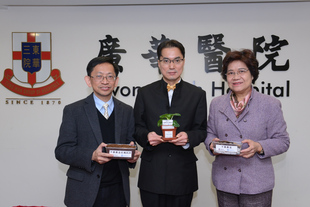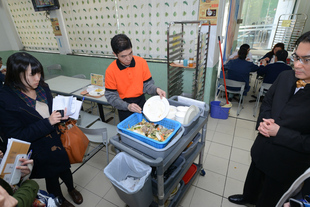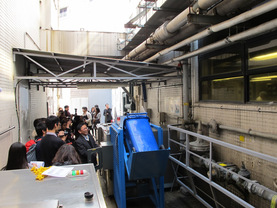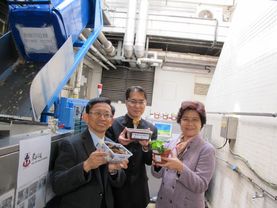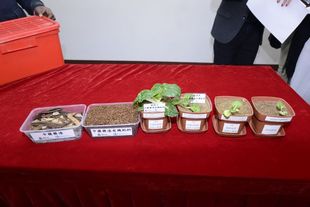Collaboration of TWGHs and HKBU Making Debut on Research of Producing Compost Derived from Chinese Medicinal Herbal Residue and Food WasteDiscovery of New Technology Yielding Pathogen Resistant Compost with Unprecedented Cost-effectiveness and Time-Ef
From official statistics of Hong Kong Environmental Protection Department, about 40% of the daily municipal solid waste in Hong Kong disposed at the landfill is food waste. Facing the exigent running out of the operation of landfills in just a few years’ time, Hong Kong is in an acute need for a sustainable solution for waste disposal.
The leading Chinese medicine service veteran Tung Wah Group of Hospitals (TWGHs) has been vigorously devoted in green projects in recent years through its wide-spanning services for the community. In view of the escalating daily yield of Chinese Medicinal Herbal Residue arisen from the increasingly sought-after Chinese medicine services of the Group, TWGHs is collaborating with the Sino-Forest Applied Research Centre for Pearl River Delta Environment of the Hong Kong Baptist University (HKBU) to develop the innovative ‘Chinese Medicinal Herbal Residue and Food Waste Composting Technology’, by staging the pilot run of this first-of-its-kind research project in Hong Kong at the green enthusiast Kwong Wah Hospital, taking advantages from the available Chinese medicine residue and food waste produced locally every day.
The 18 months project commenced in November 2012 with the joint efforts of TWGHs and HKBU. The first phase was a laboratory feasibility study which developed an ideal formulation for food waste and Chinese medicinal herbal residue composting in the laboratory of the Sino-Forest Applied Research Centre for Pearl River Delta Environment. The results showed that using Chinese medicinal herbal residue was effective in maintaining a long thermophilic phase for almost three weeks, and shortened the maturity period from 7-9 weeks to 5-6 weeks. The decomposition rate reached 67%, which was 10% higher than the control treatment without Chinese medicinal herbal residue. The germination index was also increased by 27%. Additionally, 40% of the active compounds in Chinese medicinal herbal residue were left after normal decoction and most of which have antipathogenic effects. In the second phase, a composter was installed at Kwong Wah Hospital to process the food waste collected from the food waste separation program in the hospital staff canteen, in combination with the Chinese medicinal herbal residue collected from the Clinic of Chinese Medicine. The optimum compost formula developed in the laboratory has been adopted in this on-site operation.
Dr. Eric Chan, Director of Corporate Affairs of The Hong Kong Institute of Facility Management (HKIFM), suggested that corporations can promote green by using renewable energy, reusing condensed water from air-conditioning system, fully applying heat exchanger to maximizing the value of waste heat, organizing green seminars and adopting green practices. Food waste reduction is one of the corporate green initiatives of HKIFM to encourage organizations to promote green in operations.
Professor Li Handong, Centre Manager of Kwong Wah Hospital – The Chinese University of Hong Kong Chinese Medicine Clinical Research and Services Centre unveiled that the client population of the Chinese medicine services in the Kwong Wah Hospital has been on the rise to nearly 60% in the past 4 years. The need of using decocting services increases 40%, giving a daily yield of Chinese medicinal herbal residue to 160kg. A continued rise of Chinese medicinal herbal residue is expected. Since the commencement of this pilot project, an approximate of 30-40kg Chinese medicinal herbal residue has been used for composting. Along with the improving performance of the system, it is believed that the Chinese medicinal herbal residue disposal work can be made in a more easy and cost-effective manner.
Professor Jonathan Wong, the project-in-charge from HKBU explained that reutilization of food waste through composting is a sustainable waste management strategy and contributive to the exigent food waste problem in Hong Kong. He believes that the new technology using Chinese medicine herbal residue is a win-win solution, by not only producing compost with anti-pathogenic properties which are favorable to crop growth, but also taking advantage from the inherent bulking property of the Chinese medicinal herbal residue that can save money from sourcing bulking agent for the food waste composting process.
- END -
For media enquiries, please contact Corporate Communications Branch, at 2859 7857.
(From right) Professor Li Handong, Centre Manager of Kwong Wah Hospital – The Chinese University of Hong Kong Chinese Medicine Clinical Research and Services Centre, Dr. Eric Chan, Director of Corporate Affairs of The Hong Kong Institute of Facility Management (HKIFM) and Professor Jonathan Wong, the project-in-charge from HKBU.
Staff of the Kwong Wah Hospital staff canteen performing food waste separation.
Demonstration of the operation of the composting machine.
Cabbage (Middle) grown with organic fertilizer containing adequate amount of Chinese Medicinal Herbal residue, which gave rise to the germ resistant ability of plant, grows more luxuriant and healthier than the others lacking of (Left 1 & 2) or with insufficient amount (Left 3) of Chinese Medicinal Herbal residue.




